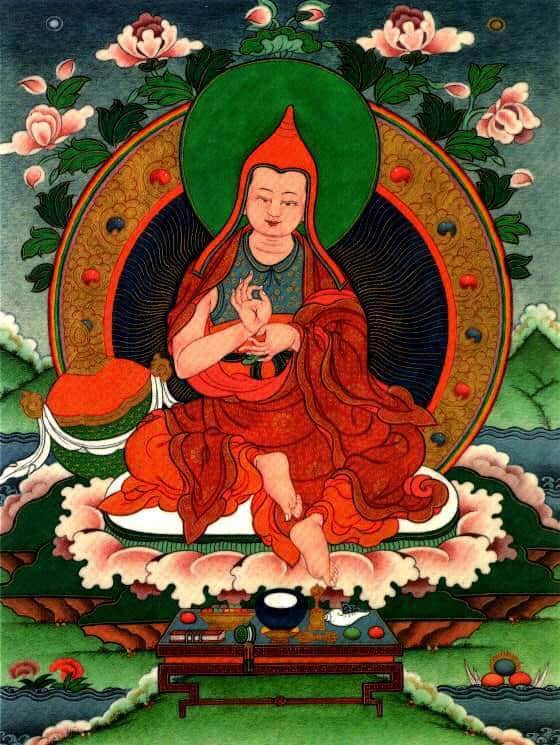Gyalsé Tokmé Zangpo (1297-1371), also known as Gyalsé Ngulchu Tokmé, was born in Puljung, southwest of the Sakya Monastery in Tibet. At fifteen years of age, he traveled to Bodong Evamling Dharma Center where he devoted his time to textual study under the tutelage of Lama Kunga Gyeltsen. After being examined on Abhidharma by Jamyang Nyima Gyeltsen and from his many scholarly accomplishments, he earned the epithet Tokme Zangpo (thogs med bzang po), which translates as “non-obstructed good”. Later in his career, he was also given the title of Gyalse, meaning “son of the Buddha,” or bodhisattva. He served as the abbot of Bodong Evamling for about nine years, from 1326 to 1335.
In 1337 he moved to Ngulchu Chodzong (dngul chu chos rdzong) where he undertook retreat for over twenty years. During this time he continued to teach, offering both Lamrim and Lojong instructions and related topics to the renowned Sakya scholar Rendawa Zhonnu Lodro. He also gave him teachings on the Bodhisattvacāryāvatāra. Tokmé Zangpo is listed as the seventy-third in the Lamrim lineage.
Gyalsé Tokmé is said to have composed some one hundred and fifteen works, some of which were printed in a single volume. Chief among these are A Commentary on the Seven-point Mind-training (blo sbyong don bdun ma’i khrid yig), the Thirty-seven Practices of The Bodhisattva (rgyal sras lag len so bdun ma), and The Ocean of Good Saying (legs par bshad pa’i rgya mtsho), a commentary on the Bodhisattvacāryāvatāra.
His masterpiece, the Thirty-Seven Practices of a Bodhisattva, contains short verses or slogans that lead one through the core of the Buddhist path—the mind of compassion. In the text, he informs the reader that this was composed in the Ngülchu Rinchen Cave.
Namo guru!
This illusory heap of a body, which, like others, I possess—
If it falls sick, so be it! In sickness I’ll rejoice!
For it will exhaust my negative karma from the past.
And, after all, many forms of Dharma practice
Are for the sake of purifying the two obscurations.If I am healthy, so be it! In freedom from sickness I’ll rejoice!
When body and mind are well and at ease,
Virtuous practice can develop and gain strength.
And, after all, the way to give meaning to this human life
Is to devote body, speech and mind to virtue.If I face poverty, so be it! In lack of riches I’ll rejoice!
I will have nothing to protect and nothing to lose.
Whatever quarrels and conflicts there might be,
All arise out of desire for wealth and gain—that’s certain!If I find wealth, so be it! In prosperity I’ll rejoice!
If I can increase the stock of my merits that will suffice.
Whatever benefit and happiness there might be, now and in the future,
All result from merits I have gained—that’s certain!If I must die soon, so be it! In dying I’ll rejoice!
Without allowing negative circumstances to intervene,
And with the support of positive tendencies I have gathered,
I will surely set out upon the genuine, unerring path!If I live long, so be it! In remaining I’ll rejoice!
Once the crop of genuine experience has arisen,
As long as the sun and rainfall of instructions do not diminish,
If it is tended over time, it will surely ripen.So, whatever happens then, let us always cultivate joy!
In response to a question from a Sakya geshé, asking what should be done in the event of sickness and the rest, I, the monk Tokmé, who discourses on the Dharma, set down these ways of bringing sickness and other circumstances onto the spiritual path.
Sarva maṅgalam!
How to Transform Sickness and Other Circumstances by Gyalsé Tokmé Zangpo. Translated by Adam Pearcey, 2007. Edited by Phillippa Sison. Revised 2012.


